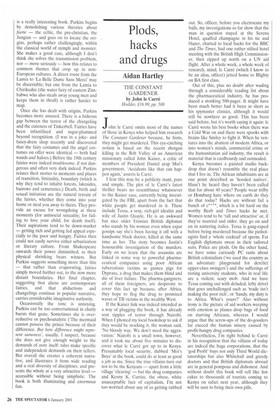Plods, hacks and drugs
Aidan Hartley
THE CONSTANT GARDENER by John le Can't' Hodder, £16.99, pp. 508 John le Cane omits most of the names of those in Kenya who helped him research The Constant Gardener because, he hints, they might get murdered. This eye-catching notion is based on the recent shotgun killing in the Rift Valley of an American missionary called John Kaiser, a critic of members of President Daniel arap Moi's government. 'Accidents like that can happen again,' asserts le Cane.
I fear this may be a publicity stunt, pure and simple. The plot of le Carre's latest thriller bears no resemblance whatsoever to the Kaiser case, currently being investigated by the FBI, apart from the fact that white people get murdered in it. These include Tessa, a sexy, rich-girl idealist and wife of Justin Quayle. He is an awkward but nice older Etonian British diplomat who stands by his woman even when expat gossips say she's been having it off with a handsome black doctor, killed at the same time as her. The story becomes Justin's honourable investigation of the murders. Early on we learn that the assassins are linked in some way to powerful pharmaceutical companies using poor African tuberculosis victims as guinea pigs for Dypraxa, a drug that makes them blind and die of liver failure. The pharma-gangsters, all of them foreigners, are desperate to cover this fact up because, after Africa, they hope to flog the drug to promised waves of TB victims in the wealthy West.
If the Kaiser link was indeed intended as a way of plugging the book, it has already sent ripples of terror through Nairobi. When I phoned my local bookshop to ask if they would be stocking it, the woman said, 'No bloody way. We don't need the aggravation.' Nairobi is a small town, however, and it took me about five minutes to discover what le Cane got up to in Kenya. Presumably local security, dubbed `Moi's Boys' in the book, could do at least as good a job as me. Since the true villains turn out not to be the Kenyans — apart from a little village 'clearing' — but the drug companies and Kenny K. Curtiss, the obese, white unacceptable face of capitalism, I'm not too worried about any of us getting rubbed out. So, officer, before you electrocute my balls, my investigations so far show that the man in question stayed at the Serena Hotel, quaffed champagne in his tie and blazer, chatted to local hacks for the BBC and The Times, had one rather stilted hotel meeting with the British High Commissioner, then zipped up north on a UN aid flight. After a whole week, a whole week of research, mind, le Carre (which I know to be an alias, officer) jetted home to Blighty on BA first class.
Out of this, plus no doubt after wading through a considerable reading list about the pharmaceutical industry, he has produced a stonking 500-pager. It might have been much better had it been as short as his spymaster classics, although it would still be nowhere as good. This has been said before, but it's worth saying it again: le Carre wrote his best books when there was a Cold War on and there were spooks with brains like Smiley to fight it. When he ventures into the abattoir of modern Africa, or into women's minds, commercial crime or the humanitarian aid industry, the result is material that is cardboardy and outmoded.
Kenya becomes a painted studio backdrop that doesn't resemble the real place that I live in. The African inhabitants are at one point described as 'hooded natives'. Hasn't he heard they haven't been called that for about 40 years? People wear trilby or Homburg hats: where on earth do they do that today? Hacks are without fail a bunch of c****, which is a bit hard on the worthy Beeb and Times hacks he met. Women tend to be 'tall and attractive' or, if they're married and older, they go on and on in nattering italics. Tessa is gang-raped before being murdered because the pathologists find a 'whole cocktail' of sperm. Fat English diplomats sweat in their tailored suits. Police are plods. On the other hand, we have some curiously PC rants about British colonialism ('we used the country as an adventure playground for derelict upper-class swingers') and the sufferings of rioting university students, who in real life are a violent, scary mob. And we have Tessa coming out with deluded, lefty drivel that goes unchallenged such as 'trade isn't making the poor rich', or 'Sandy, my duty is to Africa. What's yours?' Also without irony is the picture of aid workers weeping with emotion as planes drop bags of food on starving Africans, whereas I would argue that the screw-ups of the do-gooders far exceed the human misery caused by profit-hungry drug companies.
Nevertheless, I'm right behind le Carre in his recognition that the villains of today are indeed the huge corporations, that the 'god Profit' buys not only Third World dictatorships but also Whitehall and greedy doctors and that British diplomats abroad are in general pompous and dishonest. And without doubt this book will sell like hot cakes to thousands of tourists coming to Kenya on safari next year, although they will be sure to bring their own pills.


















































 Previous page
Previous page